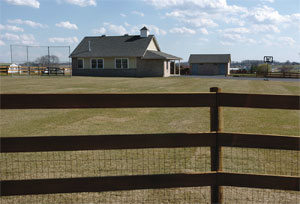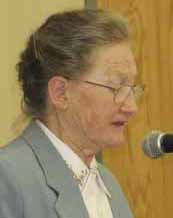Canadian Mennonite
Volume 11, No. 21
October 29, 2007
Nickel Mines a year later
NICKEL MINES, PA.
 |
Following the shootings at the Amish school in Nickel Mines on Oct. 2, 2006, people around the world wanted to share however they could. Many people gave financially to help those affected by this tragic event.
Donors from around North America and elsewhere contributed more than $4.3 million to the Nickel Mines Accountability Committee in the months following the tragedy that saw 10 schoolgirls shot, five fatally. About one-third of the funds have been utilized to date and plans are underway to place the balance in a trust fund for the ongoing expenses of victims and their families.
The committee has also made contributions to the charity funds of several medical providers that gave medical service, and to some of the volunteer public service organizations that responded to the event. A contribution was also made to Marie Roberts, widow of the gunman, who took his own life.
Additional funds were contributed to the school committee for construction of New Hope Amish School. Classes moved from a temporary location set up the week after the shooting, to the new school in April of this year. The children are reported to be enjoying their classes, but they keenly miss the girls who died. Four of the five injured girls have been in school since December. Two of the four have missed some school days for rehabilitative therapy or corrective surgery, but have kept up with their school assignments.
To the casual observer life goes on in Nickel Mines, with its daily and seasonal demands of work, school, births, family and church. But for the families, each day brings with it the pain, grief and questions that remind them of their loss.
The strength of community in Nickel Mines helps the families cope with this event, which changed their lives forever. Sharing their experiences with family and friends in the church community, and the steadfast support of others in helping the families do their work, are essential components of the healing process. For some, reaching out to others who have suffered similar tragedy is part of their own healing. Recently 29 people travelled to Blacksburg, Va., to meet with school officials and families of the Virginia Tech shootings, to show their concern and to deliver the comfort quilt that had been given to Nickel Mines.
The forgiveness extended by the Amish community to the Roberts family was noted around the world. The Amish did not wish such publicity for doing what Jesus taught and want to make sure that glory is given to God for that witness.
One family, whose oldest daughter died instantly at the scene, stated in a recent update to the Amish community: “‘God has given. God has taken. Blessed be the name of the Lord.’ That verse from Job has given us a lot to think about . . . since the terrible happening at West Nickel Mines School.”
Rays of light
World Council of Churches delegation learns how Christians respond to violence with forgiveness
PARADISE, PA.
From the farms and rolling hills of Pennsylvania’s serene Amish countryside, where five young schoolgirls were killed a year ago, to an immersion into the inner-city violence of Philadelphia, a World Council of Churches Living Letters delegation learned first-hand how profound tragedy can suddenly impact everyday life. But they also saw rays of light where forgiveness and reconciliation are helping to create a more humane society.
Members of the team, on a nine-day visit in September to meet with U.S. church and community leaders in several cities, included a South African ecumenical leader, a public health specialist from Lebanon, a Brazilian ecumenist and a human rights lawyer from Pakistan. The visit of the four-member team, called Living Letters, is part of an initiative by the World Council of Churches (WCC) to mobilize churches around the world to seek peaceful alternatives to violence.
Experiencing Christian hospitality over lunch in an Amish farmhouse near Paradise, delegation members talked with an Amish deacon and their host, and learned in graphic detail how, a year ago, a dairy truck driver with no apparent history of violence barricaded himself in a one-room schoolhouse and, after releasing all of the boys, shot 10 schoolgirls, five of whom died, before killing himself. One of the girls still lives on life-support.
Many people around the world, grief-stricken by the news of the shooting among people who traditionally have stood for non-violence and peace, responded with more than $4 million in aid to help pay for hospital costs and counselling expenses for all the families affected. Within days, members of the Amish community called upon the widow and children of the killer, offering forgiveness and financial assistance for the family.
“We took this forgiveness and reconciliation as a huge lesson,” Marcelo Schneider from Porto Alegre, Brazil, told the Amish leader. He added that in his home country, people would rather “look for revenge, for more blood to be shed,” believing that this was necessary for the benefit of Brazilian society.
“I come from a violent part of the world and, when I read of the details, I was touched by the way the Amish reacted. It was inspirational,” said Lina Moukheiber of Beirut, Lebanon, a member of the Greek Orthodox Church.
“It was something that challenged people’s imagination,” agreed the Rev. Hansulrich Gerber, the WCC coordinator of the Decade to Overcome Violence. “We talk about forgiveness, but our [countries’] national systems of punishment and persecuting offenders don’t generally make room for forgiveness.”
The deacon, who in the Amish tradition asked that his photograph not be taken nor his name published, said Amish reaction to the tragedy included the same questions other Christians have had at such moments: “We asked, ‘Why did God let this happen?’”
Both Amish men said the Amish struggle to live up to the expectations of others. “We are not a perfect people,” said the host. The deacon added, “We just hope we can live up to the way people think we are.”
In Paradise “we found the meaning of following Christ to the last consequence,” Schneider wrote later in a blog. Commenting on the public’s reactions to the forgiveness of the shooter, Schneider quoted the Amish deacon: “Isn’t that what Jesus has told us to do all of the time?”
Goodbye, my friend
First published in Saskatchewan, Der Bote returns to its roots for farewell celebration
SASKATOON
 |
Although the turnout was small at the first of many farewell celebrations for the German paper, no-one could ignore the fact that Der Bote, now more than 80 years old, had a widespread impact on the Mennonite community.
First published on Jan. 14, 1924, in Rosthern, Sask., the fledgling paper greeted its newly formed readership with the words, “Das Jahr 1923 wird in der Geschichte der Mennoniten unvergessen Bleiben.” (“The year 1923 will, in the story of Mennonites, remain unforgotten.”) The annual subscription rate then was $1.54 for a four-page weekly.
Those opening words seemed to foreshadow the use and intent of the widely read publication for many years after, as it allowed readers to also remember their past lives in another country and to correspond with each other in their mother tongue.
Bernard Stobbe, who arrived as a new immigrant in 1949, recalls reaching often for his father’s copy, and later ordering his own subscription. Stobbe has found the publication helpful in finding connections with long-lost relatives through the obituaries. Further to that, he sees much value in the paper. “The things I appreciate are the stories people write of their experiences in Russia,” he said.
Despite many grateful readers like Stobbe, Der Bote will cease publication next March.
Dave Bergen, executive secretary for MC Canada’s Christian Formation Council, which oversees publication of the paper, said that the conference could already see the writing on the wall 12 years ago. Citing a dwindling readership as the main reason, Bergen acknowledged the emotional response felt by readers. “It comes with significant feelings of loss and grief,” he said.
Esther Patkau has fond memories built around the paper. “The Bote was a welcome visitor in our home for many years,” she said during her speech to the white-haired group assembled at Bethany Manor on Oct. 13. Among other things, the former missionary to Japan said the paper helped immigrants find new roots in a strange, unfamiliar land and, indirectly, acted as a bridge from one continent to the next.
Patkau noted how, in each decade of its existence, the publication spoke to the issues of the day. In the 1930s, there were important articles about farming and crop failures. In the ’40s (during the war years), Der Bote wrote about conscientious objection. During the ’50s, the paper was a much-needed tool to reunite families.
Reader response to the demise of the paper had been varied.
“There is deep disappointment and grief at the loss,” said Heinz Bergen, speaking during the program.
But Dick Epp offered a different perspective. “Don’t grieve that it’s ending. . . . It has preserved so much of our history,” he said.
Patkau captured the emotions of others with her final comments: “Goodbye, my friend.”